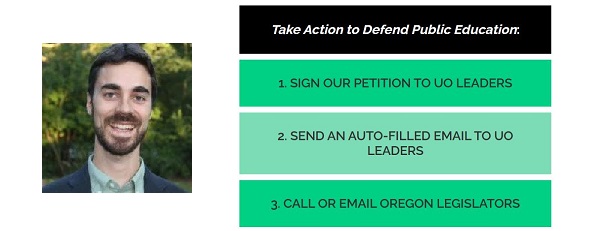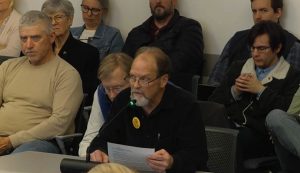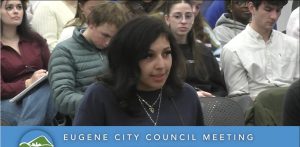Faculty members alert community: UO plans to eliminate entire departments, fire tenured professors
9 min read
Presenter: For KEPW Reports, Jana Thrift:
Jana Thrift (KEPW): Hello, this is Jana with KEPW-LP 97.3 FM in Eugene, broadcasting online at KEPW.org and today I have a very important topic that I want to cover, and I have Jeff Schroeder here. He’s an associate professor with Religious Studies at the University of Oregon, and what is happening at the University of Oregon right now that you’re trying to let people know about?
Jeff Schroeder (University of Oregon): There are massive, drastic changes being carried out at the University of Oregon right now, during the summer. There are plans to eliminate entire programs, fire dozens—we don’t know the number—of faculty, including many tenured faculty.
[00:00:53] These changes are being carried out very suddenly and undemocratically. The faculty are not being given an opportunity to have a say in this process. We could even call them DOGE-like cuts, similar to what’s happened elsewhere with the federal government here, right here, at University of Oregon, we’re seeing drastic cuts just being carried out without consultation.
[00:01:17] And this is a threat in so many ways. It’s a threat to those very important humanities programs, which I’ll tell you about in a moment. So it’s a threat to the course offerings for our students. It’s a threat to the ability to get a good liberal arts education at what is meant to be the flagship university of the state of Oregon.
[00:01:36] It’s a threat to individual faculties lives and their families. And a bigger point is that it’s also a threat to tenure and academic freedoms.
[00:01:47] I’ll share all the details that I can, but I just want to say right off the bat that there are things people can do to go and gather more information and to take action steps. We have a website, the faculty union created a website, StrengthenUO.org, that is full of information. You can sign a petition, you can write to your elected leaders, you can write to UO leadership once you’ve learned what’s going on.
[00:02:13] So nothing is official yet, which is a good thing. It means there’s still time to change, but we understand the president of the University, Karl Scholz, has announced that the week of Sept. 7 termination letters will be sent out and the decisions will have been made. Okay? So we’re talking about a few weeks between now and the final decisions.
[00:02:39] What we hear about meetings between University leadership and department heads is that there are plans to entirely eliminate the departments of Religious Studies, Judaic Studies, Arabic Studies, Holocaust Studies, Classics, German and Scandinavian, and Russian.
[00:03:04] In addition, there are proposed downsizings, so program reductions including firing of tenured faculty from programs such as Women’s and Gender Studies, Indigenous, Race and Ethnic Studies, history, math, physics, and the list goes on.
[00:03:26] All of these changes are being carried out very quickly without faculty consultation. They have some kind of money problems that they’re trying to address. But the way they’re trying to address it is totally at odds with the model of shared governance at the University where everyone is supposed to have a say.
[00:03:44] Faculty should have a say in how their programs are downsized. We know effective ways of carrying out changes that might need to be done. But it seems like the UO leadership, the highly-paid UO leadership are making unilateral decisions, and carrying this out, again, over the summer.
[00:04:05] This is really, I think, a crisis of management and not of finances. You can go again to StrengthenUO.org for more details on the finances and the lack of transparency on the part of University administrators.
[00:04:21] But supposedly these financial problems were just discovered suddenly this past March. Right up through March, University of Oregon was hiring lots of faculty, including my department. We were hiring brand new faculty. Classics was hiring faculty, German was hiring faculty. And then suddenly they figured something out that they had some kind of major financial problem, and now suddenly they’re turning around and planning to close—entirely eliminate—the programs that just had been growing and having new faculty hires and new coursework.
[00:04:59] So this means faculty who are hired to begin work at the University of Oregon on Sept. 16 will be fired just as they arrive. Faculty who were hired last year will be fired. Like, it doesn’t make any sense. It’s a huge waste of resources. It’s really drastic, unwise measures that have all untold negative consequences for people’s lives, but also for the future of the University of Oregon as a respected and strong institute of higher education.
[00:05:34] Presenter: Jana Thrift for KEPW Reports: The University of Oregon is planning to eliminate entire academic departments. From the Department of Religious Studies, Jeff Schroeder:
[00:05:44] Jeff Schroeder (University of Oregon): Budget cuts are going to be unpopular. It seems like the University administration has taken the strategy that if they can just do it in one fell swoop all over the summer when nobody’s listening and able to respond, that they can somehow lessen the pushback.
[00:06:02] But we are doing everything we can to mobilize and to create that pushback right now and just insist for more time, for more shared conversations about: What is the financial situation facing the University, and how can we solve this problem together?
[00:06:20] Like, there’s all kinds of other solutions. I’ll just name a few real quickly while we’re talking about this subject.
[00:06:26] A first step should be incentives for early retirement. If faculty are nearing retirement, if they’re giving an incentive, they might retire early, then they lose some of that cost, but it’s in a voluntary and sort of shared way. There could be hiring freezes, there could be pay cuts to these very, very well-paid administrators.
[00:06:48] You can go to StrengthenUO.org to see the salaries of the University president and provost and so forth. There are definitely other ways to solve it. It seems to me that this is a calculated choice, to go ahead and move the University in a certain direction without faculty input because they know it will be unpopular—and without student input.
[00:07:11] It’s very clear that the humanities are being specifically attacked here. The programs targeted: Religious Studies, Judaic Studies, Arabic, Holocaust Studies, Classics, German and Scandinavian, Women’s and Gender Studies, Indigenous, Race and Ethnic Studies. Even history is a humanities discipline.
[00:07:30] The humanities are about literature, language, English literature, comparative literature. The humanities are the study of history, the study of cultures, the study of religion, the study of philosophy. It’s comical, it’s ludicrous that one needs to explain the importance of studying cultures or history, right?
[00:07:51] We study history to learn from mistakes, to understand historical forces, I mean, name your issue. How do we understand fascism and the rise of authoritarianism in history so that we can respond to trends in our world today?
[00:08:05] Religion, classics and philosophy. Big big-question disciplines that talk about the nature of reality, talk about values, how we ought to structure our societies. How we can retain our humanity and not let AI algorithms and economic forces structure our lives and our social choices. Languages, culture.
[00:08:28] We need these disciplines so that students at Oregon, and the public that benefits from all the research that comes out of the University, can be more informed, engaged global citizens.
[00:08:39] Can you imagine at the University of Oregon, there will be no more world religions courses? I’m sure lots of us have taken those courses, whether it’s in college or high school, or can understand the importance of world religions.
[00:08:55] Whether you’re a religious believer or not, religion is obviously a really central, influential, huge factor in human history in U.S. politics, in global conflicts. So how are our students going to be prepared to navigate this world, to navigate politics, to navigate, to be international leaders, if they can’t take courses in Arabic or Judaic Studies or Religious Studies or Islamic Studies?
[00:09:27] It’s true that some of these programs that are up for elimination may not have the most majors. We have more students signing up to major in economics or computer science and so forth. But very bright, wonderful students love our classes in Religious Studies.
[00:09:48] It may not be well known that Tina Kotek, the governor of Oregon, is a graduate of University of Oregon and majored in religious studies.
[00:09:57] So religious studies is an important discipline for our leaders and for informed citizens. So I hope that the listeners can appreciate and understand the importance of the humanities.
[00:10:08] As for why the administration is cutting these programs specifically, I can only speculate because they’re not being transparent about their decision-making processes…
[00:10:18] I like to think that there are no sort of nefarious intentions of specifically censoring certain disciplines at work here. I think we can also explain this as a matter of money, that the UO leaders are maybe thinking of the University as a corporation and thinking about what the best ways they can get return on investments and what are the sort of biggest moneymaking fields and departments and areas of research and so forth.
[00:10:49] So we’re not seeing the same cuts from the business school or from the Knight Campus where various scientific and technological research is happening. We’re seeing the cuts at the humanities, which have their own value that isn’t immediately relevant to the bottom line.
[00:11:07] There’s one other point that I would really like to highlight here, and that is the attack on tenure. Just to be clear, this is a very unprecedented firing of tenured professors, other professors, other faculty have been laid off. So it’s not only tenured faculty that were being targeted and all the firings are regrettable and problematic.
[00:11:30] But the tenure system exists to ensure stability of employment for faculty who are engaging in research that may be controversial. So you’re protected from firing, in case somebody decides that your research is not acceptable.
[00:11:47] So you can think of various censorship and attacks on scholarship about the history of the United States and racism, for example. We need established, respected faculty to have their work protected so that they can’t be fired at the whims of the people who hold the levers of power, right.
[00:12:07] And so when they make these cuts, these are brand-new. This has not happened at the University of Oregon. They’re trying to exploit an article in the collective bargaining agreement that only allows for tenured faculty if an entire program is reduced or eliminated. And that’s supposed to be for academic reasons, not financial reasons, certainly not for temporary or cyclical variations in finances and they’re using this apparent loophole to fire tenured faculty, which has not happened at the University of Oregon before, but will establish a dangerous precedent.
[00:12:46] So these protections for faculty who are maybe doing unpopular research will not exist at the University of Oregon. That’s bad for academic freedom, but it’s also bad for the University of Oregon. Because if tenure exists at all the other strong quality, respected universities and colleges around the country, why will good scholars want to come and work here? They won’t, and that’s going to be bad for the University. It’s going to be bad for the students.
[00:13:15] And so, that’s another element, another layer. It’s possible that the administration would like to have that power to be able to fire whoever they want whenever they want. And we can’t let that happen.
[00:13:26] So, again, I just want to remind anyone who’s listening, thank you for listening, please go to StrengthenUO.org to learn about what’s happening and to click on ‘Take Action’ and you can sign a petition. You can write letters. You can try to raise the alarm about this right now because we only have a couple of weeks before they will be handing down their judgments and decisions.
[00:13:50] This is a threat on all kinds of levels, but it’s certainly a threat to the city of Eugene. I just encourage folks to go to the StrengthenUO.org website and to try to gather information. We’ve got letters coming in from academic associations around the country expressing their solidarity with us. We’re trying to get ahold of Tina Kotek’s office. We’re trying to speak to our representatives, because this is all being pushed through in this sudden, rash, unwise, an undemocratic way.
[00:14:21] Please help us spread the word, and thank you for listening.
[00:14:25] Presenter: Jana Thrift for KEPW Reports, on a proposal to eliminate entire academic departments, which under a loophole in the collective bargaining agreement, would allow the University of Oregon to fire tenured faculty. You can learn more and get involved at StrengthenUO.org. And listen for the latest from KEPW 97.3, Eugene PeaceWorks community radio.
See also: Artist, UO student Inés Beltranena addresses President Scholz on proposed cuts




